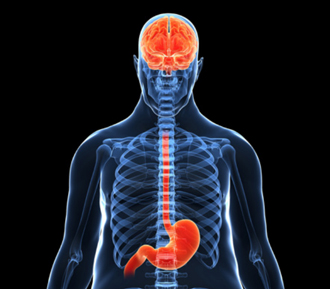A new study by researchers at the National Institute on Alcohol Abuse and Alcoholism (NIAAA) provides further evidence that a hormone produced in the stomach influences alcohol consumption in humans. As reported in Molecular Psychiatry, researchers led by Lorenzo Leggio, M.D., Ph.D., demonstrated that the hormone, called ghrelin, may be a promising target for developing new medications for alcohol use disorder (AUD).
Dr. Leggio, Chief of the Section on Clinical Psychoneuroendocrinology and Neuropsychopharmacology, an NIAAA intramural laboratory jointly funded with the National Institute on Drug Abuse, noted that preclinical studies have shown that ghrelin has complex interactions with the brain, including the brain’s reward and stress pathways. Ghrelin is known mostly for its role in regulating appetite and is often called the “hunger” hormone.
“While studies in animals have pointed to ghrelin’s possible role in alcohol-seeking behavior, its impact on alcohol intake by humans has been unclear,” says Dr. Leggio.
In the current study, Dr. Leggio and his colleagues conducted a randomized, placebo-controlled study of humans who were heavy drinkers with AUD. Mehdi Farokhnia, M.D., a Postdoctoral Fellow in Dr. Leggio’s intramural laboratory, is the first author of the study.
In the study, participants received either ghrelin or placebo, intravenously. In one experiment, the participants could press a button to receive an intravenous infusion of alcohol during the ghrelin or placebo session. The researchers found that ghrelin, compared to placebo, significantly increased the number of alcohol infusions self-administered by the study participants. Participants were also significantly faster to initiate alcohol self-administration when they received ghrelin, compared to placebo.
In another experiment, study participants receiving either intravenous ghrelin or placebo underwent brain imaging. Imaging data showed that ghrelin increased alcohol-related brain activity in the amygdala, a part of the brain’s stress systems implicated in alcohol-drinking behaviors. The hormone also influenced food-related brain activity in the medial orbitofrontal cortex and nucleus accumbens. The data indicate that ghrelin affects alcohol-seeking behavior in humans and represents a potential new target for AUD medications development.
Reference:
Farokhnia, M.; Grodin, E.N.; Lee, M.R.; Oot, E.N.; Blackburn, A.N.; Stangl, B.L.; Schwandt, M.L.; Farinelli, L.A.; Momenan, R.; Ramchandani, V.A.; and Leggio L. Exogenous ghrelin administration increases alcohol self-administration and modulates brain functional activity in heavy-drinking alcohol-dependent individuals. Molecular Psychiatry November 14, 2017. PMID: 29133954
